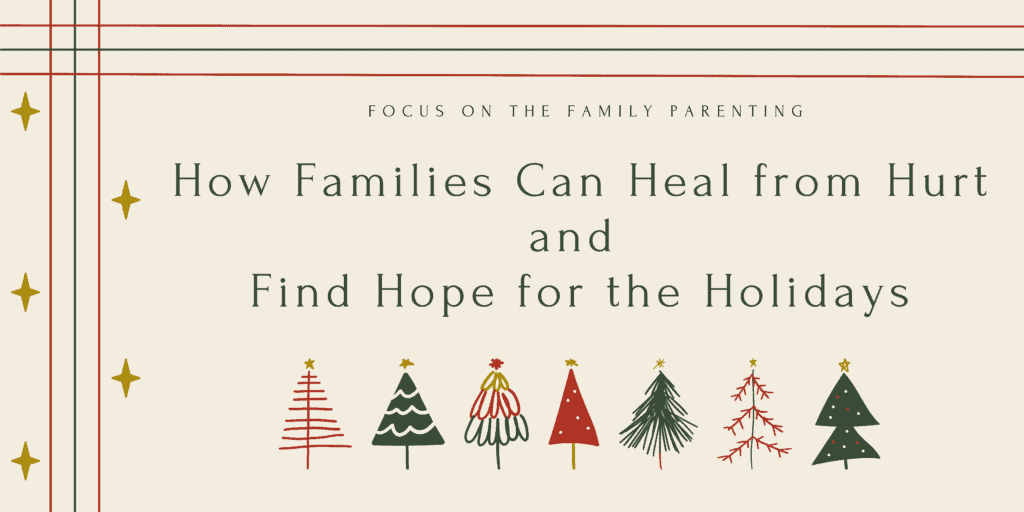
Coping With Christmas After Losing a Child
Dreading the holidays after losing a child is normal.

As you prepare for the holidays, consider how God might be calling you to experience Him this season.
Two years post-divorce I celebrated my first Christmas without my children. I awoke early that morning, but not to the sounds of excited whispers and tiptoeing feet as I had for the twelve years before. This time, there was little hope for the holidays.
I made my way to the kitchen, but not before passing our Christmas tree which stood without a gift nestled below it. Coffee in hand, I peered out at neighborhood children gleefully tossing handfuls of snow at each other on a rare white Christmas morning.
How stark and still my home seemed on this morning, especially compared to the merriment going on all around me. My thoughts wandered.
I wonder what my kids are up to. I really wish I was sharing this white Christmas with them. They must be so excited. I bet they are going to have blast with all this snow.
I eased into my chair and collapsed under the weight of silence. Then, I tried to escape into worship music, but still felt the draw toward something more seasonal. I found myself comforted unexpectedly by the lullaby of Christmas music. Suddenly, I wept as the words washed over me.
As I wrestled with the emotions of the morning, never in my life had the meaning of Christmas been more tangible. In my sorrow, I realized that Jesus did not come for presents and pancake breakfasts and picture-perfect celebrations.
No, He came for the weak and worn out, for the sin-battered and abandoned – He’d come for people like me. And in my grief grew hope, in knowing this broken world is not my home. This is not all there is.
But still, the suffering of my present reality suffocated me. I cried to God, “It’s not supposed to be this way!” Gently, He received me, and tended to my broken heart. He knew it was not supposed to be this way.
As I worshiped in solitude, I was both painfully and joyfully aware that my experiences were but a picture of what God would have us understand about Christ’s coming in the view of eternity. And though we have been rescued, while we are in this place, we will have grief and hope, sorrow, and peace – side by side.
Those closest to Jesus understood the gravity of what it means to experience both joy and sorrow simultaneously in this life. Explore the following examples from the Bible to find hope for the holidays.
Consider Mary. After Jesus is born, Mary and Joseph bring Him to the temple to be presented. During the occasion, a man named Simeon prophecies over the young Christ and His mother. He says:
“‘This child is destined to cause the falling and rising of many in Israel, and to be a sign that will be spoken against, so that the thoughts of many hearts will be revealed. And a sword will pierce your own soul too’” (Luke 2:34-35).
That last line is so striking: “A sword will pierce your own soul too.” To this point, Mary had been told that her child would be the Son of God. However, the specifics had not quite been as clearly described until now.
We can only imagine the joy and sorrow that she must have felt as He grew up. Each moment of His young life viewed through the lens of this ominous prophecy.
Jesus’s disciples struggled to come to terms with His impending crucifixion as well. Immediately after revealing Himself as Messiah, Jesus foretells of His eventual death.
Matthew 16:22 says, “Peter took him aside and began to rebuke him. ‘Never, Lord!” he said. “This shall never happen to you!’”
Sometimes having to hold joy and sorrow together leads to the denial of one experience or the other. Even if you’ve never been in Peter’s situation, I think we can all relate to moments where we simultaneously felt joy and sorrow.
Finally, at the Last Supper, Jesus consoles His bewildered followers just prior to his death.
In John 16:20-22, Jesus says, “Very truly I tell you, you will weep and mourn while the world rejoices. You will grieve, but your grief will turn to joy. A woman giving birth to a child has pain because her time has come; but when her baby is born, she forgets the anguish because of her joy that a child is born into the world. So, with you: Now is your time of grief, but I will see you again and you will rejoice, and no one will take away your joy”.
Jesus compares our grief to the pain of childbirth. We may be grieving while everyone around us is celebrating, but our grief is not without purpose. In our grief, Jesus promises great joy. As we experience His presence in the midst of our heartache, we can hold on to the hope of eternal life where things are exactly as they are meant to be.
I know it doesn’t exactly look like the “kids playing in the snow” kind of joy we all expect and hope for. But God’s way always leads to something greater, something deeper, something long lasting. Because despite the promise of joy, Jesus knew we could never experience the fullness of true joy in this life.
As such, He ends His encouragement to the disciples saying, “I have told you these things, so that in me you may have peace. In this world you will have trouble. But take heart! I have overcome the world.” (John 16:33).
Trouble and peace. Hurt and hope. Together.
At times, the holidays can feel like a special season to bask in the hope that is ours in Christ. But other times, they are a painful reminder of the sufferings we must endure in this life on the way there.
Both are meaningful and valid expressions of our natural experiences. As you prepare for your observance and search for hope for the holidays, consider how God might be calling you to experience Him this season.
Often our kids may be struggling with their emotions as well, but it comes out in ways that are not always quite so obvious. Perhaps you have a child who is being especially defiant, or another who is more clingy than normal. Some children will act out more when they are struggling, while others will become more compliant or withdrawn.
Often kids cannot always explain or pinpoint what they are feeling. However, when we as parents are in tune with our own emotions, it is easier for us to help our children navigate the process.
First, engage with your child compassionately by trying the deep breathing and sensory exercises described above. As they are ready, you might then ask open-ended questions, or use a feelings chart to help them label their feelings. As they do, demonstrate understanding with expressions like, “I could see why you’d feel that way with everything that is going on. Would you tell me more?”
Some children will take you up on the invitation while others will not. Don’t feel compelled to force a conversation; you’re simply opening the door to let your child know they are received and loved, big emotions and all.
Whenever you feel overwhelmed with emotion, take a few minutes by yourself and experience God’s presence. Try deep breathing practices as you sit in the awareness of the presence of God. As you rest, you might talk with God about what you are going through.
You might also consider how you can sense God’s comfort through your senses; you might try wrapping yourself in a weighted blanket or dabbing essential oils on your skin. As you do, sense the Holy Spirit tending to you through your mind, body, and spirit, wrapping you with compassion, comfort, and security.
The traditions and trimmings of the holidays are often a reminder of what we’ve lost, or what we never had. It’s easy for our minds to go down the rabbit hole of what could have been but doing so usually compounds our grief.
When you need help taking your thoughts captive, consider having a couple of go-to Scriptures to “change the channel” in your mind, and instead usher in God’s compassionate presence. A couple of my favorites are “I will never leave you, nor forsake you” (Hebrews 13:5), and “Behold, I make all things new” (Revelation 21:5).
Let’s face it- the holiday season is full of emotional triggers. Experiencing triggers does not mean you are weak; it means you’re at your limit. You may be tempted to fight through, ignore, numb out, or escape.
And while these are temporary fixes, they’ll contribute to a greater meltdown in the future. During the holidays, placing boundaries around your time is an important way to stave off being overwhelmed. Consider saying “no” to certain gatherings or events, keeping your schedule light, and getting to bed earlier.
Consider how you can choose hope for the holidays this year. Lean into the Lord’s plan for you this season.